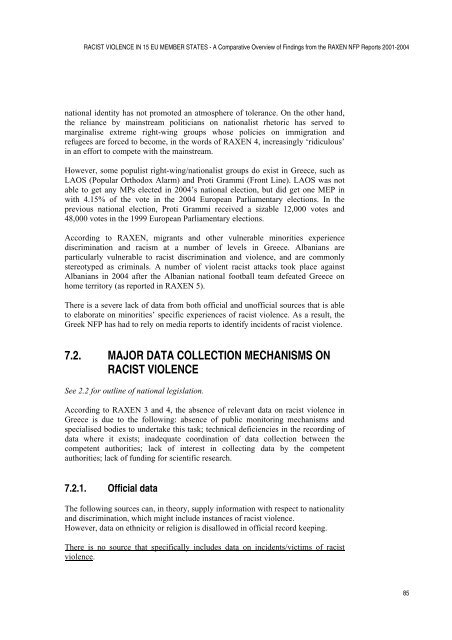RACIST VIOLENCE IN 15 EU MEMBER STATES - Cospe
RACIST VIOLENCE IN 15 EU MEMBER STATES - Cospe
RACIST VIOLENCE IN 15 EU MEMBER STATES - Cospe
You also want an ePaper? Increase the reach of your titles
YUMPU automatically turns print PDFs into web optimized ePapers that Google loves.
<strong>RACIST</strong> <strong>VIOLENCE</strong> <strong>IN</strong> <strong>15</strong> <strong>EU</strong> <strong>MEMBER</strong> <strong>STATES</strong> - A Comparative Overview of Findings from the RAXEN NFP Reports 2001-2004<br />
national identity has not promoted an atmosphere of tolerance. On the other hand,<br />
the reliance by mainstream politicians on nationalist rhetoric has served to<br />
marginalise extreme right-wing groups whose policies on immigration and<br />
refugees are forced to become, in the words of RAXEN 4, increasingly ‘ridiculous’<br />
in an effort to compete with the mainstream.<br />
However, some populist right-wing/nationalist groups do exist in Greece, such as<br />
LAOS (Popular Orthodox Alarm) and Proti Grammi (Front Line). LAOS was not<br />
able to get any MPs elected in 2004’s national election, but did get one MEP in<br />
with 4.<strong>15</strong>% of the vote in the 2004 European Parliamentary elections. In the<br />
previous national election, Proti Grammi received a sizable 12,000 votes and<br />
48,000 votes in the 1999 European Parliamentary elections.<br />
According to RAXEN, migrants and other vulnerable minorities experience<br />
discrimination and racism at a number of levels in Greece. Albanians are<br />
particularly vulnerable to racist discrimination and violence, and are commonly<br />
stereotyped as criminals. A number of violent racist attacks took place against<br />
Albanians in 2004 after the Albanian national football team defeated Greece on<br />
home territory (as reported in RAXEN 5).<br />
There is a severe lack of data from both official and unofficial sources that is able<br />
to elaborate on minorities’ specific experiences of racist violence. As a result, the<br />
Greek NFP has had to rely on media reports to identify incidents of racist violence.<br />
7.2. MAJOR DATA COLLECTION MECHANISMS ON<br />
<strong>RACIST</strong> <strong>VIOLENCE</strong><br />
See 2.2 for outline of national legislation.<br />
According to RAXEN 3 and 4, the absence of relevant data on racist violence in<br />
Greece is due to the following: absence of public monitoring mechanisms and<br />
specialised bodies to undertake this task; technical deficiencies in the recording of<br />
data where it exists; inadequate coordination of data collection between the<br />
competent authorities; lack of interest in collecting data by the competent<br />
authorities; lack of funding for scientific research.<br />
7.2.1. Official data<br />
The following sources can, in theory, supply information with respect to nationality<br />
and discrimination, which might include instances of racist violence.<br />
However, data on ethnicity or religion is disallowed in official record keeping.<br />
There is no source that specifically includes data on incidents/victims of racist<br />
violence.<br />
85
















